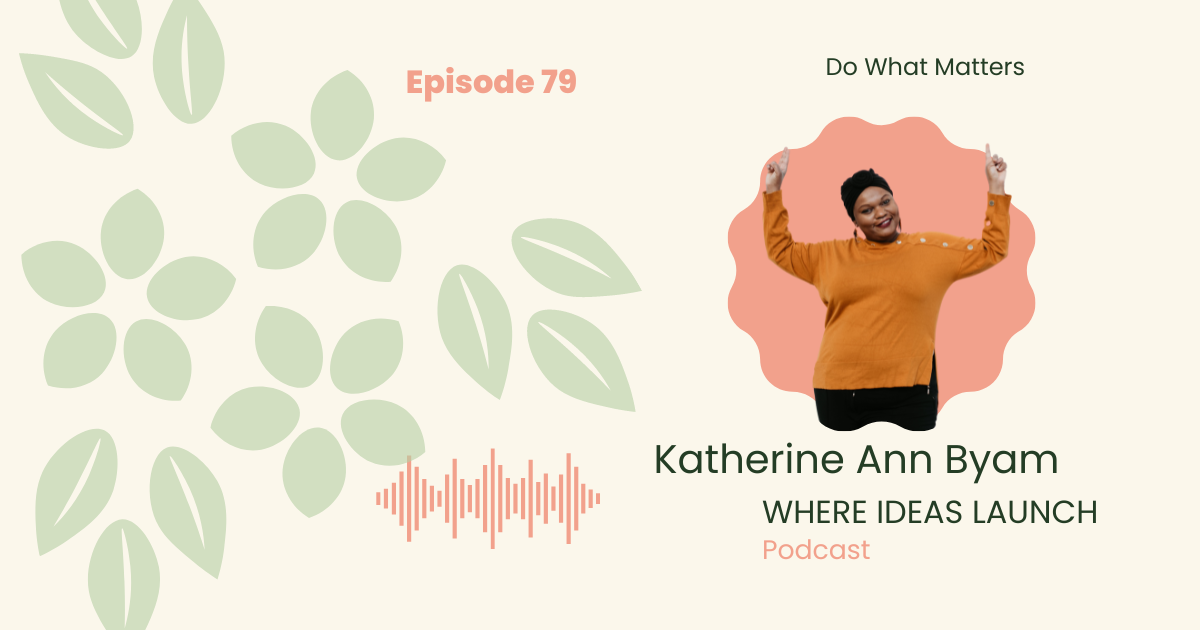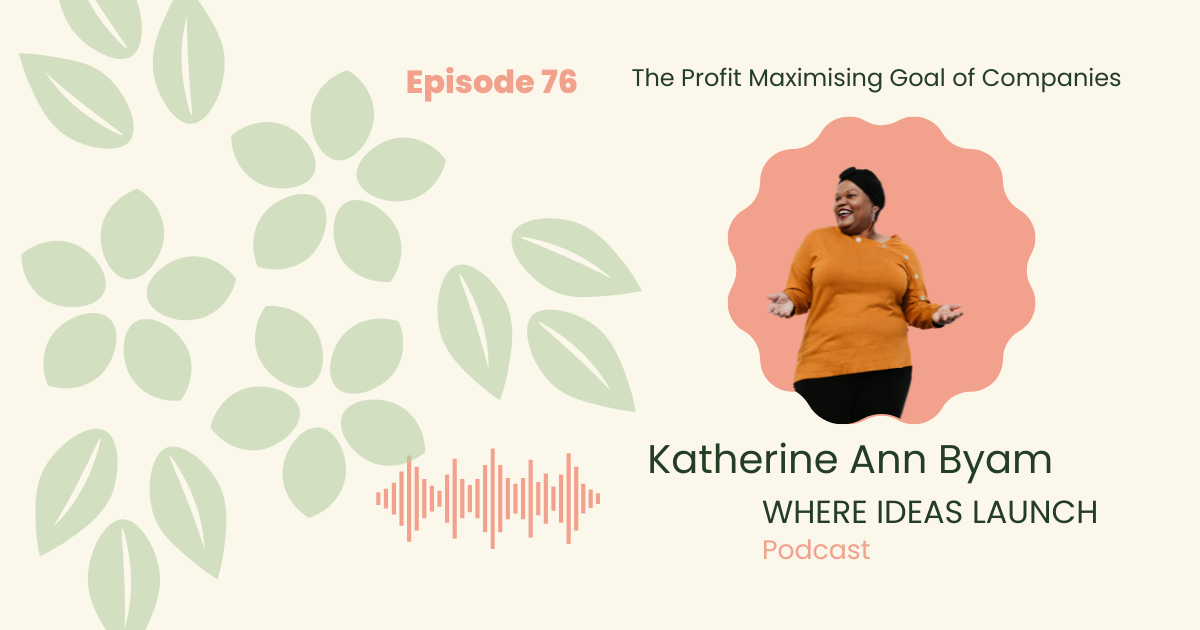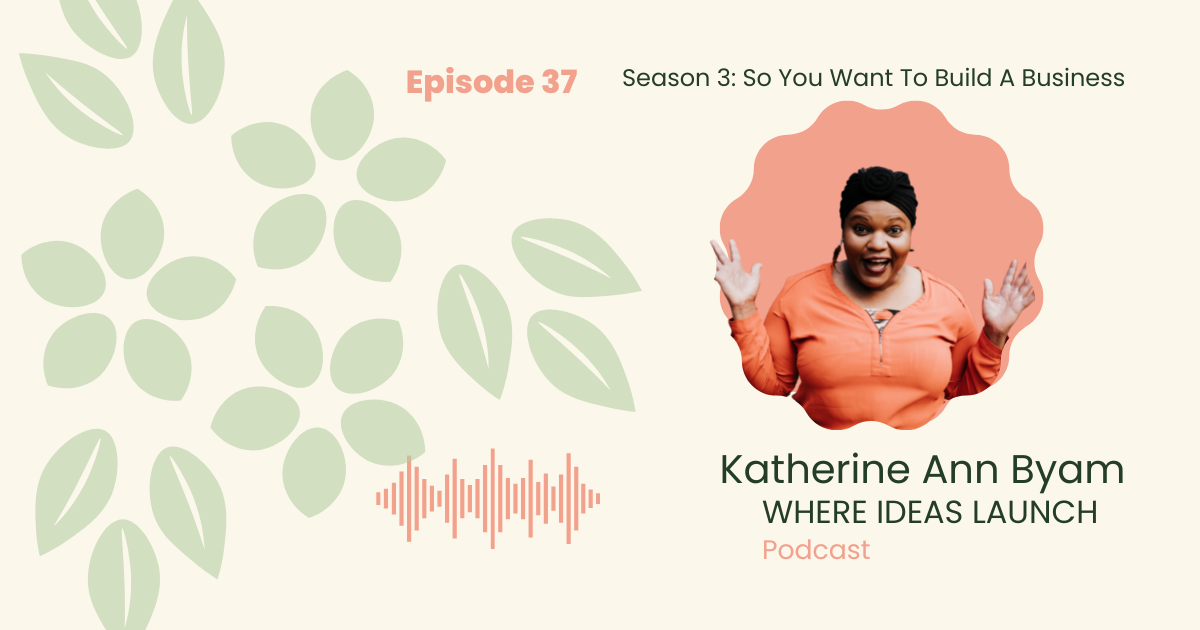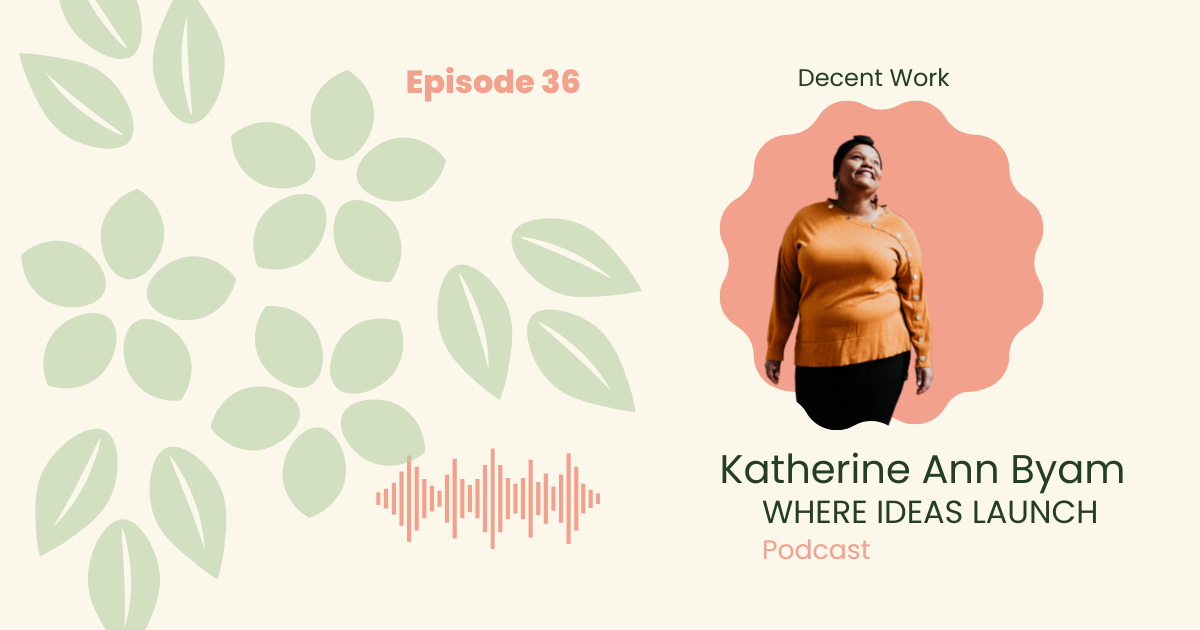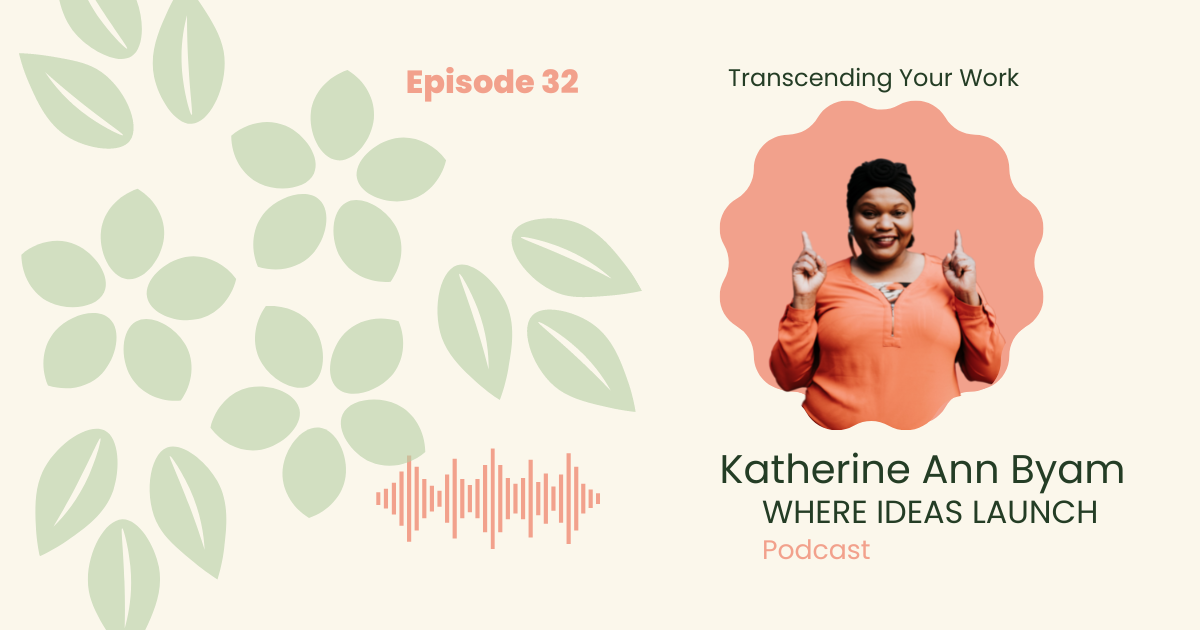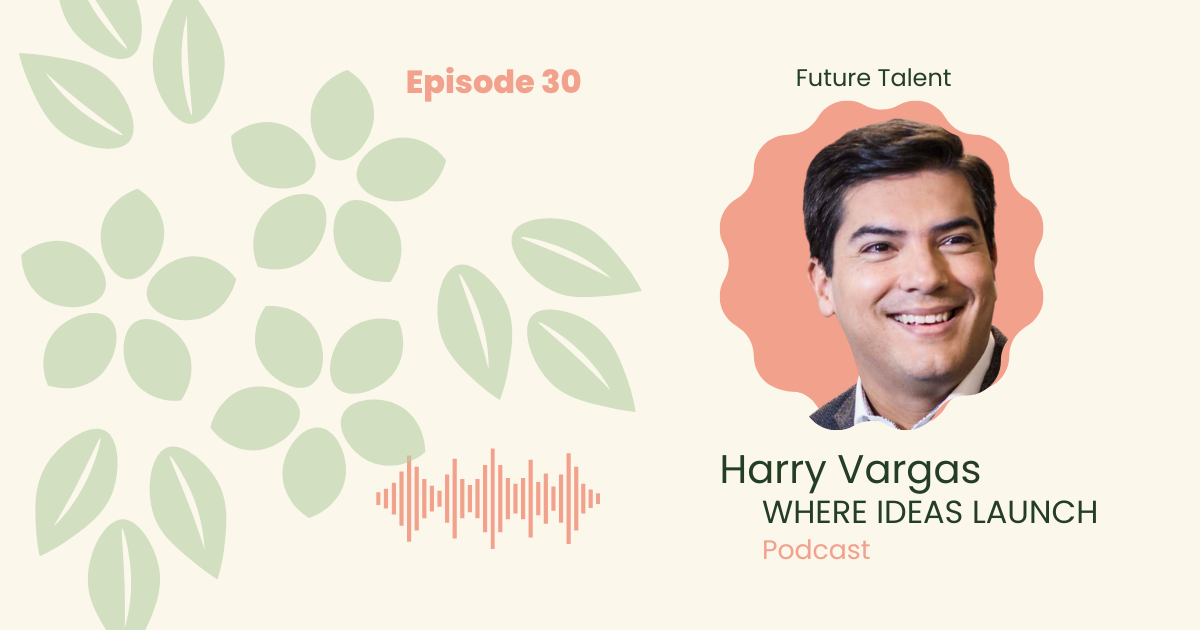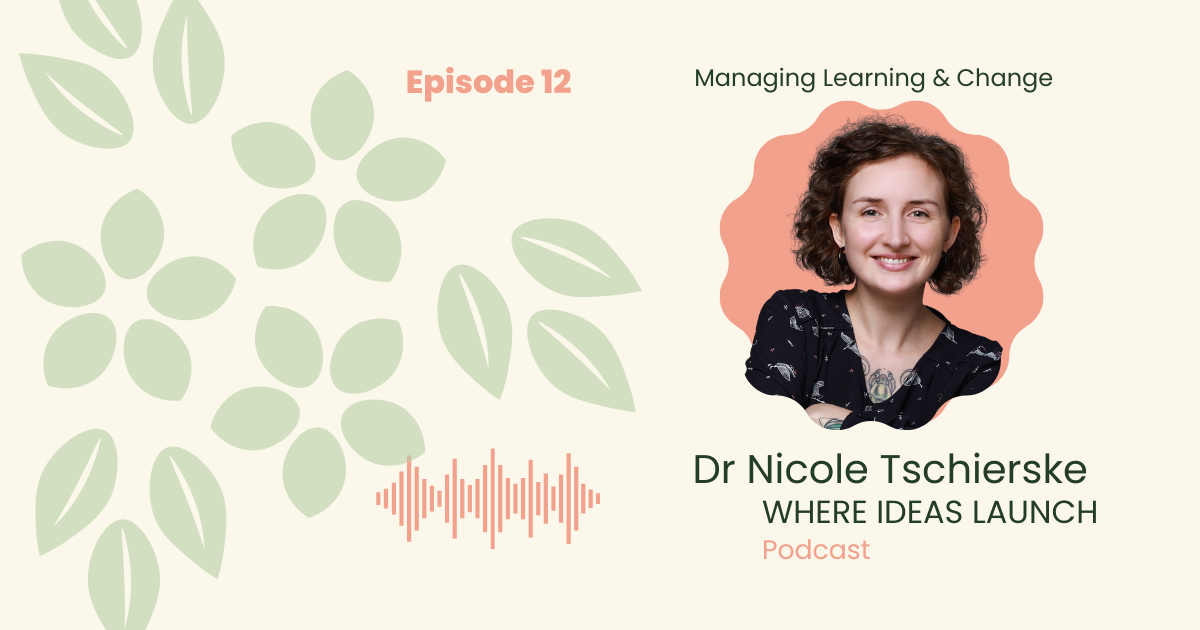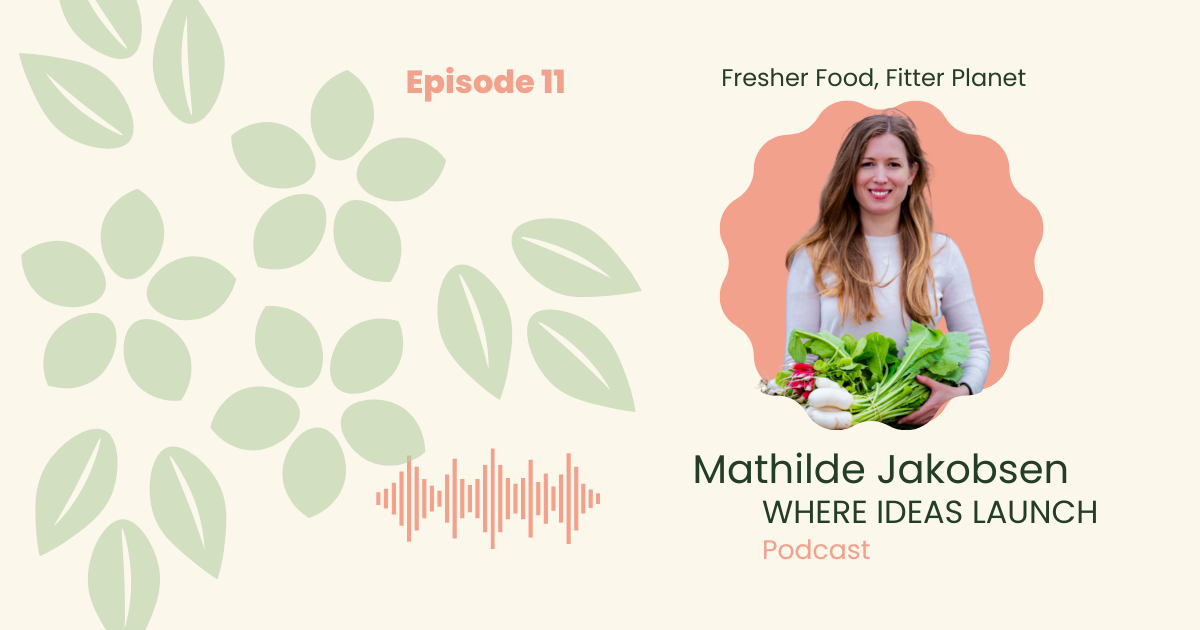084 Youth Perspectives on Sustainability and Change
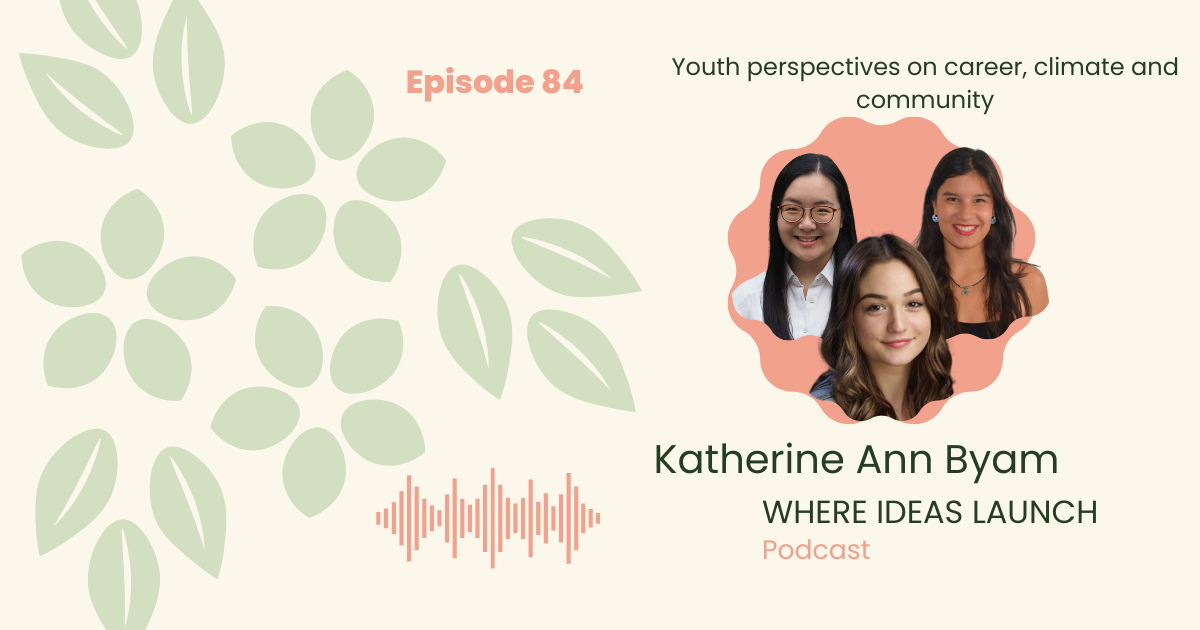
About this Episode
They are our present and our future, although it’s not quite in their hands. This is the generation that’s already bringing change to pale, male and stale boardrooms around the world, but will they run out of time? We talk about careers, sustainability and the journey of these young women to create a future they want to be a part of.
Serena Coccioli
Serena is a Colombian-Italian who graduated in Ecological and Environmental Sciences from the University of Edinburgh building her sustainability career.
Belinda Ng
Belinda is a youth advocate for sustainable food systems who has just completed an MSc in Environmental Technology from Imperial College London.
Kailin Jo Spencer
Kailin is a senior at the University of Washington – Seattle focusing on sustainable curriculum advocacy within the Foster School of Business and researching small business sustainability.
Subscribe to Where Ideas Launch
Connect with this episode's Guests
Episode Transcript
Katherine Ann Byam 0:01
I recently read an article about what the rich are doing to save themselves from the rest of us, and climate change. What are your thoughts when you read stuff like this?
Serena Coccioli 0:11
I mean, sometimes we like to point the finger at billionaires, at people who have a lot of money. But really, we all need to take a step back. And sometimes it's more about taking action like we're in this together, we have to find a solution.
Belinda Ng 0:23
I think I can offer a counter perspective to Serena's, which is that I think it's a very unfortunate reality of capitalism and the world that we have today, there are a very small amount of people that are a lot more privileged. And in many ways, money is an enabler of their current lifestyles. And it's what's been a huge cause of the issues that we have right now with sustainability., and these people have the capacity to save themselves, sucks.
Kailin Jo Spencer 0:47
The ones that are building themselves the bunkers, I say alright have fun, but the ones that are investing in some technologies that will assist in us being able to live with the damage that we've already caused, thank you.
Katherine Ann Byam 1:04
This is season five, the great debates of our times, Season Five will be centred around the great debates. And we will be comparing and contrasting different viewpoints on various topics that are consuming the public discourse at present. The reason I've decided to take this approach is because, we or at least many of us, are losing the skill of debate. And I think this is an essential skill for us all to practice once more. I don't see how we get to the point of saving the world and saving our planet, if we don't know how to discuss our differences. I also think that the solution to most of our challenges is somewhere in the spectrum of views but never at either extreme. I will be working with guests to curate the content and discuss beforehand, I will understand their positions, their areas of genius, and navigate my questions around that so that the conversation is challenging and stimulating without being combative. I hope you enjoy Season Five of Where Ideas launch; The Sustainable Innovation Podcast.
Today, I am blessed to have three amazing talents joining me for this show. I have Serena who is a Columbian-Italian who graduated in Ecological and Environmental Sciences from the University of Edinburgh, building her sustainability career. I have Belinda who is a youth advocate for sustainable food systems who has just completed an MSc in Environmental Technology from Imperial College in London. And I have Kailin who is a senior at the University of Washington, Seattle, focusing on sustainable curriculum advocacy with the Foster School of Business and researching small business sustainability. Thank you so much, ladies for joining me, welcome to both of my podcasts, this episode is airing on Do What Matters, The Career and Leadership On Purpose Podcast, and on Where Ideas Launch; The Sustainable Innovation Podcast. So I'm really, super chuffed to have you all with me. So I'm gonna start with Serena. Serena, I met you on Instagram, you had been following my podcast Where Ideas launch for some time. And you decided to work with me on your journey and on your pivot. So I wanted to learn a little bit about what you've been up to.
Serena Coccioli 3:16
Of course, yeah, it was. Thank you, Catherine, for the introduction for this opportunity. Yeah, we connected quite a while ago now I don't remember exactly, but it was amazing that we connected straight away, and you were straight up inspiring to me because of your incredible career and all the things you did sustainability related environment related, but also policy and changes and, and getting into interesting fields as well that then related all to what you're doing now, and all those experiences are coming together. So it was inspiring. And I guess I see myself as at the start of that. So when I first came across your podcast, and we got in touch, I remember I was looking for work, I was looking for a job in sustainability. I was also looking at opportunities to help other people. And what I'd already learned from my degree in environmental and ecological sciences. So it was a really, it was a really exciting time for me because I was looking and I was working so hard every day and trying to find something and I really appreciate the connection. And then we had that chat about like where I was, looking at almost like a business audit, like what are you doing now? Where can you take this? Where can you go? And it was really, really insightful. And I remember thinking, wow, like I have so much potential to just keep doing what I'm doing and also look for a job and getting experience in the field. And I think for some time I thought that they were at odds like I had to just focus on one. Whereas I brought those together and now I'm living the best of both worlds I guess and getting more experience as I go. So yeah, that's pretty cool.
Katherine Ann Byam 5:03
Yeah really, really well done. And you know, I look forward to learning more about your journey as we go, as we go through this. So I'm gonna switch now to Belinda. So we met on a hackathon. And it was a sustainable hackathon. It was a carbon capture conversation, and you won to place in my career club. So I just wanted to talk to you about about your journey since then.
Belinda Ng 5:24
Yeah, I think, gosh, it really surprises me how fast time has gone by like, it really just seems like not that long ago, that the Hackathon was finished. And the whole experience of being part of the Courageous Career Club. As Sarena mentioned, I'm also at the start of the career. So it was a really good opportunity to get to understand more about different perspectives from people that have been working for quite a while. So yeah, it's been quite a crazy journey since then, wrapping up the masters and figuring out what the next step is.
Katherine Ann Byam 5:55
Yeah, I know. And we're gonna get into that, for sure. And Kailin, we met when you were doing research and my community, Women In Sustainable Business, what's happened with that research? And where are you taking it now?
Kailin Jo Spencer 6:06
So my research is focused on small businesses sustainability. And I got to connect with Katherine via an interview, and I interviewed her as an expert with my environmental studies capstone project. And I found that the kind of main solution is something that you're already working on, which is collaboration and getting people together to share their ideas and their experiences and their resources. Because small businesses don't have the revenues that these large corporations do to invest in research technology, and all of those things that would further sustainable business operations. But I'm now kind of focusing inwards on my school, University of Washington, and looking at how we can increase sustainable curriculum and focus on the ground up approach of educating young business owners on how to implement sustainability from the ground up instead of trying to trickle it in from the top down. But that's what I'm working on now.
Katherine Ann Byam 7:04
Yeah, I think it's great. It's an important thing, because I do get the sense that although young people are the future of this thing, and so passionate about it, there's still so many pockets of people who still don't have enough knowledge about this. And for me, this knowledge is as important as math and english, right? You know, in sort of the the English school curricula. And so I think it's really relevant what you're doing. So really, congratulations on that. I wanna move now and ask you all, probably starting with Serena, again, what made you get into this area? And what was the burning platform for you what, what makes you want to leverage change the most?
Serena Coccioli 7:45
I started with loving nature, as many, many of us do, and really wanting to do something towards animals, I thought of doing marine biology, maybe zoology, things like that. And then when I came across the ecology and environmental sciences courses at Edinburgh, I was really struck by how many different things I could try, I could try the ecology side, I could try the environmental side. And the reason why that was better was because it was more of a broader perspective and understanding the system as a whole, rather than looking into the deep cellular biology, for example. And when I did the degree, it was a four year degree. So it gave me the opportunity to try lots of different modules, and to start to align my degree into whether it was going to be environmental or ecological. And actually, at the end of that, I realised how I loved both so much. But I thought strategically, because of my point in time, I wasn't in the best health, I thought, I'm going to focus a little bit more on the environmental, something where I can do a job that's more aligned with what I need right now. And then it started with that and looking at the jobs out there. And actually looking back now to the things that were offered, then they weren't as exciting. And now even if it's only been three years, I'm looking now it's like, wow, like there's so many cool opportunities, things are springing up so much. So it's really been quite a big shift. And I think that's really important. Really interesting.
Katherine Ann Byam 9:15
Yeah, there's a super head hunt going on for ESG people, and it's a bit insane at the moment. So it's a good time to be in the space for sure. They probably were spoilt for choice. And then when we get there, maybe we're not so sure that the organisations are doing the best work. So that's always going to be an issue and a challenge as well. And Belinda?
Belinda Ng 9:35
Yeah, I resonate a lot with what Serena said about being a nature lover and growing up with that, but I also think, yeah, since we've already mentioned education, in the conversation so far, like my degree studying geography has been a key part in raising my awareness about the actual complexity of the issues that the world is facing in different parts of the globe and for different communities. So really understanding the nitty gritty of that. and the sheer volume like, not the volume, but like the sheer scale of the problem that we're facing has been very key to motivating me to be working in this space and understanding more about what I can do as an individual as well. So the kind of second strand of that is my own first hand experiences, working with less privileged communities that have been directly affected by things like climate change. And that's kind of really made me understand that, given that we all are global citizens, and we need to take, do our own part to also help support those that are less privileged, I think, that's why sustainability is a really interesting feel for me, because there's so many entry points in there.
Katherine Ann Byam 10:40
Love that. And, Kai?
Kailin Jo Spencer 10:42
My journey is actually very, very similar as well. I started out, I think my passion kind of arose when I was growing up with the outdoors is my backyard, and that was my playground. So I grew up on Alki Beach, which is on the west side of Seattle, Washington, and we would go on nature walks with my family, and in preschool, and throughout all of my education. And then I moved to Vashon Island, where the whole island is pretty much surrounded in forest. And so recess was just in the forest. And we would go to the retention ponds, and we would experiment with science observations. And so that was where my passion started. And then on the other side, I was also getting fed with reducing your carbon footprint. So that was my early education was reduce your carbon footprint, turn the lights off, when you go and leave the room, turn the water off when you're brushing your teeth. And I remember asking my mom kind of like, what's going on? And she's like, well, like nature that you love, so much like, is kind of in danger. And so that's where my passion was found. And then in school, I remember it was focused on reduce, reuse, recycle. So then that was the next phase of, and then so I have these three stages. And this last stage very similar to you Belinda is environmental justice. So I, in my higher education, I realised it's not just about recycling, it's not just about reusing, it's about the communities that are disproportionately affected by these environmental impacts. And that was where kind of advocacy has grown from. And I've had a really interesting time learning about the history of Seattle and Washington with indigenous peoples and the history of America. And just grappling with all of that, and realising that it's not so black and white, has been a super interesting journey. And it's been quite discouraging, sometimes, which I think we can all agree on. But I, I'm also excited because I think when you're met with so many questions, that you're closer to getting maybe an answer. It's kind of my thinking sometimes. But yeah.
Katherine Ann Byam 12:52
Yeah, I think it's such a highly complex area and for you to be studying in this field, you have to be sort of versed in all sorts of disciplines, in order to be able to do this work that you're doing so, so it really makes you I think, a really wide open people is my perspective. So I think it's a great time of your life to sort of be here. So what I wanted to kind of explore with you, you all have your entire careers ahead of you at the moment, you know, you're just getting started, some of you or you're just finishing. And what does growth actually mean to you in the context of everything that you're learning? All that you know about our planet? And about our economics? What does growth actually mean to you? What what does success look like? For someone who is an advocate and passionate person about sustainability? What, I'll start with Serena again.
Serena Coccioli 13:47
Sure. I mean, it's such a huge, I don't even know where to start, really. But I mean, for me grow, growth and sustainability, as some of the things that already kind Belinda mentioned is that being open minded to learning and being curious and understanding, and really connecting with other people who are experiencing things differently to you. And it's kind of looking at the bigger picture and trying to find out where your strengths are and where you can contribute in that picture. And from that, trying to learn personally, but then growing your impact. So I talk a lot about, with the business owners that I've talked to, growing the positive impact that they have and trying to create a business model that is inherently trying to do better, rather than taking things away and then compensating for them afterwards. So having that mindset, mindset is such a huge thing of my whole sustainability journey, and just generally what what I think is important to consider, is having that growth mindset isn't necessarily the one that we think economically like we need more, more, more, it's more about how can you make the things that are there better? How can you have better connections? And how can you integrate a better way of relating to nature, relating to communities, relating to yourself as well, all of these things tie in together and understanding them as a whole, which is why I love understanding it as a whole, and the whole ecosystem, things like that is because that is really how we can then move forward, because we need to have that holistic understanding. And we need to realise that we're all interconnected, it's not all about my experience, my experience of what I experienced when I go to Colombia is very different to when I go to Italy, and also here, and all the other countries in between. So it has to be coming from a place of always learning, but always bringing other people up and collaborating in this, in this journey.
Katherine Ann Byam 15:50
Love it. And Belinda for you?
Belinda Ng 15:53
Yeah, I agree so much with what everything Serena said, my first response to that was also being really open minded and try new things. I think I'm a big believer of pushing out of your own comfort zone, that's the best way to really learn. And so a key part of that is also being really experiment, experimental. And, you know, testing out what's effective, what works for me, which I think also applies in the wider context of sustainability. Because how we got here to where we are now in terms of the history of the world, and development has also been quite experimental in many ways. And so we have a shorter window of time to be more experimental, now to really fix some of these issues. But I think a key part of that is having this mindset to do that. And then the end goal really being how we can do more with less essentially.
Katherine Ann Byam 16:43
Kailin...
Kailin Jo Spencer 16:44
When I first saw the question, I thought very similarly to Serena and Belinda have said about learning and experimenting. So growth economically is usually you can visualise it with a linear line up or down. And I think in order to achieve a more sustainable future, we're going to need to focus on a circular feedback loop where instead of just taking from our community, and then giving back from our community, we're going to be continuously listening to our consumers and all of our stakeholders. And in that process, we'll be growing our business and our selves professionally. And I think that the goal should never be an end goal, it should always be development. And it should always be experimenting, and building on what you've learned. And eventually, we hopefully will be able to get somewhere where we can coexist happily with the environment.
Katherine Ann Byam 17:43
So I'm going to throw a spanner in the works for you, for you ladies today. So I recently read an article this week, I think it was about what the rich are doing to save themselves from the rest of us and climate change. And about those billionaires who are building these great bunkers or the ones who are trying to solve ageing, etc. What are your thoughts when you read stuff like this?
Kailin Jo Spencer 18:07
is Serena starting?
Katherine Ann Byam 18:10
Nobody wants to start this one.
Belinda Ng 18:13
I'm still processing the question.
Serena Coccioli 18:14
I don't like the sentiment that technology will save us. And I don't like the sentiment that we'll figure out a solution rather than figuring out that for 1000s of years people have lived with nature in a way that's mutually beneficial. And then all of a sudden, we're just wrapped up in what we are now and just constantly consuming, consuming and doing what Kai said about just a linear approach to just, what is the end goal? Are we just creating, creating, creating, and it, you know, we're not necessarily happier people because of it. So we need to re-evaluate our priorities and the values that we have.
Katherine Ann Byam 19:05
So what happens, what happens, when the billionaires who control a lot of the resource are basically just touting one, one passage, like what do we do?
Serena Coccioli 19:20
I mean, millions are made of pounds, right? Like, I think as well, we can't necessarily, I mean, sometimes we like to point the finger at billionaires at people who have a lot of money, but really, we all need to take a step back. And sometimes we can do something. I mean, not everyone has a choice, but we can take responsibility for certain things and we don't necessarily need to fund certain companies. We can vote with our money in some ways. And obviously the biggest thing that you always get when someone says something like this is like, oh, but they have have more money and we don't have like decision power. But it's, it's taking the focus away from the action and it's putting the blame on someone else. And I think that's the issue, it doesn't really matter who is to blame. It's more about taking action like we're in this together, we have to find a solution. But we're also in the solution together. And I think that's what we need. And the learning part is so huge like what Belinda and Kai were saying we need to learn, we also need to teach the others. And in that circle of growth, we can all come out better.
Katherine Ann Byam 20:32
Belinda, what are your thoughts? What should we do with the billionaires?
Belinda Ng 20:38
I don't know if I can answer the what do we do part. But I think I can offer a counter perspective to Serena's, which is that, I think it's a very unfortunate reality of essentially, capitalism and the world that we have today, which is that there are a very small amount of people that are a lot more privileged. And in many ways money is an enabler of their current lifestyles. And it's what's been a huge cause of the issues that we have right now in sustainability. And, yeah, I mean, it does, it does bother me that, for example, one celebrity can use their private jet, like three times and that'll be the carbon footprint, footprint equivalent of maybe one household in a less developed country for like, a month. But I think it's just kind of, like, I think if I, if I really had to worry about this all the time, it would keep me up forever. And it just really botheres me. So I think it's, it's a tricky situation where it's like, in a kind of more selfish world, yeah, these people have the capacity to, I guess, if they're trying to save themselves or whatever, like they can, and it sucks, really. I really am also trying to address that and, you know, I agree with Serena in that, like, we all can do our part. But unfortunately, it's not an equal playing field for everyone.
Katherine Ann Byam 21:59
Absolutely. And Kailin.
Kailin Jo Spencer 22:03
It's a very, like push pull situation where the ones that are building themselves, the bunkers, I say alright have fun. But the ones maybe there's some that are investing in some technologies that will assist in us being able to live with the damage that we've already caused, in which I'm like, thank you. Because I know collectively, like we could vote with our money and make change as a group. But I also know that that's really challenging to get a bunch of individuals to believe that they, that their voice has impact, especially when there's billionaires on their private jets, polluting more co2 in one singular day than this person will have in their entire life. So it's really hard to say like, we're all in this together when, we're not all in this together. So I guess the answer to your question is, there is no answer as to what to do with them. We just have to keep working together as non billionaires, to show the billionaires what we really care about. And hopefully one day, we'll be able to get to a spot where everyone will be in similar playing fields, I guess. But yeah, definitely a tricky question for ya.
Katherine Ann Byam 23:21
I wanted to throw this one in and not tell you about it. So, so thank you for your very candid answers, which countries or companies you can choose either one, do you think are doing an outstanding leadership job on some of these issues that we've been discussing today?
Serena Coccioli 23:37
I always fear this question because it's, um, it's almost like, I've never really seen that, you know, I never really see, every time I've noticed a country, do something that I admire. And for a long time, it was Scotland when I was in Edinburgh, then things change, and all of a sudden their points of view change. And this isn't necessarily with a change of government or whatever, but also in the same, with the same people. And it kind of gets to me that even though we have a clear way of moving forward, and the way forward is to avoid fossil fuels and start to go towards green energy and reducing our exploitative consumption and production ways. It still tends to go towards that and we still hear our gov, like the government talk about growing after the pandemic and making up for all the loss but it's, it's not the right kind of growth. It's the growth for the sake of growth and for the numbers. So I think it's a tricky one. I would say that Scotland is one that I really admired because of the renewable energy and trying to go forward and generally, like showing actionable steps a lot of the time countries promise things that they're not very actionable you can't see them. Scotland did with a lot of things like transport, electricity, all of those things and shutting down coal power stations and that, but they're I know, they're also very tied with England in potentially, like continuing with certain oil fields. And that's all a bit controversial now again, so yeah, it's like hopeful but also disappointed. I don't think there was one like, yeah, close to home. And I mean, I'm gonna see a wait and see I've got some hope for the other two Italy and Columbia.
Katherine Ann Byam 25:36
Fair enough. This one thing I wanted to mention about this with Scotland, and I'm not sure if this actually happened, but I know that they were talking about citizen advocacy groups around certain topics. And I don't know if they actually did this. But I think if I look at what's happening with politics today, I think that this is one of the things that I would like to see a lot more of everywhere, you know, like actually getting, getting people in their communities together to talk through solutions, because it feels very top down, it feels very, you know, you will let some kind of political establishment, and whatever their policies are supposed to be the same rollout everywhere in the country, even where it's not relevant. So I feel as if this, this kind of citizen advocacy, will, will help. It's just like employee advocacy in companies, right, the the needs will be different depending on where you are, and therefore the solution will be different. And I feel like that's missing a lot. But sorry, to jump in there. Belinda, your your your guess?
Belinda Ng 26:35
Yeah this was a really hard question, because I think it depends on what the metric is for outstanding, and also depends on what the sector is. So I'm gonna give a few examples, rather than one because I think it's very difficult to pick, I think, from a company standpoint, I think Patagonia springs to mind, because it's one of the earliest ones that started this triple bottom line focus on like people, planet and profit. But obviously, they're only in one sector. And so I think right now, there's a flurry of smaller startups that are really doing amazing things in their specific field. And I'm a big fan of innovation and really pushing the boundaries with you know, circularity and what we can do there. So one of the smaller B corps that I recently think I've been doing, discovered, actually and feel like they're doing great job is the eco egg in the UK with sustainable laundry, which is something that is very tangible and applies to everyone on a household level as well. So yeah, that's kind of my ideas for the company part. And then, for countries, Taiwan springs to mind for their recycling rate, which is like 55% for household collection, which is huge. And it comes a lot from the ingraining of recycling and why it's important in education from a very young age. So yeah, I think there's loads of promising things happening. So they're very, I think that's a great thing.
Katherine Ann Byam 28:03
No, that's great. That's a great message and Kai.
Kailin Jo Spencer 28:05
Kind of similar to Patagonia is a company that was founded in Seattle, REI Co-op. And that's been one of the companies that I've, my stepmom actually got to work with them, and, and one of my friends also has worked with that company. And it's one that's kind of been a mentor, in a sense, when I'm thinking about if I wanted to start my own business, what would it look like? I think the setup would be pretty similar. And I definitely don't think they're doing outstanding, but they're doing work that is quite different than the other organisational setups of other businesses. And just some examples is they're focusing on that circular economy. So they're working with their suppliers and their partners to reduce their waste and promote reusing instead of throwing away. And then they also have that people over profits, sort of mission, but then the one that's my favourite is how much they focus on their members of the co-op and the members opinions and how those opinions are formulating the business's decisions. And so that, in turn, you're, you're not just giving your consumers a survey, and then like, looking at the data of that and making decisions, you, your members and your consumers are physically making the decisions for the company. And it's led to, in my opinion, an amazing, amazing company that everyone that I've spoken to loves to work at too, so it's, it's not just caring about the environment or caring about your consumers. I think that the value that they put on their employees and allowing their employees to opt, they have this thing called opt outside, so I think it's every other Friday. They pay their employees to just go outside and hike, or go to the lake, or something like that. So it's it's creating that good workplace environment to formulate those ideas that are going to help us get to a more sustainable future.
Katherine Ann Byam 30:01
Love that love that example, really, thanks for sharing. And now we want to move to the second to last question. If you could change one thing about how your, I want to say your current country, but you pick the country you want to pick, is currently dealing with the climate crisis. What would you change?
Serena Coccioli 30:21
I suppose leading, continuing from the one that I said earlier about moving towards greener energy, it's not the be all and end all like we don't just have to go towards green energy, we need to also do like one of the Sustainable Development Goals, whereas like responsible production and consumption and trying to go into those circular loops, like Kai was saying, so I guess focusing more on that circularity and circular business models, regeneration, those things and moving away at the same time from things that are directly affecting the climate crisis, like fossil fuels and petrol based products. So that would be the thing that I think just needs to happen, like, very quickly, and that transition cannot be hindered because they think that then people might have jobs, because that's an excuse to say, well, actually, those people can contribute to this industry. It's not these people are skilled, and they're valuable people. And they deserve to be part of something that's contributing to something bigger that they're also going to align with. So part of bringing those things together.
Katherine Ann Byam 31:32
Perfect. And Belinda?
Belinda Ng 31:34
Yeah, so my home city of Hong Kong has quite a few ambitious climate plans. A lot has been focusing on renewables and also building retrofitting. But I think there could be more focused on reducing household level and industrial level waste, especially food waste, which is very difficult to process. And a lot of the kind of emissions come from landfills, which is also a big problem in Hong Kong with like landfills running out of space. So I think, more focus on really embedding recycling and setting up the infrastructure for that, which is also very challenging, but I think, more focus on that would be really needed.
Katherine Ann Byam 32:14
And Kailin, you've got a really interesting country to talk about.
Kailin Jo Spencer 32:17
It's challenging because I'm from Seattle, where we're known as the Emerald City. So we're known as a green city. And we have probably one of the biggest sustainability efforts in the United States. And so I'm definitely coming from a bubble where ever I turn, I see all of the programmes that I hope to see in America. And then it's when I get out of Seattle, where I'm like, oh, wow, like other cities don't even know what compost is, or don't even know why they need to be recycling. And so I think America has quite a far way to go in all senses of sustainability. Because not only do the citizens not really understand the importance of it, but also like our government isn't really putting money into the right programmes. We're continuously making wrong choices on an international scale. And if I had the answer, I think I would probably be president because no one seems to really have the answer. But um, yeah, I think that there's just so much work to be done that I think everyone should maybe follow after Seattle, and start looking at what Seattle has been doing and implementing some of our, our programmes and legislations into other cities and states, and hopefully, we can get there someday.
Katherine Ann Byam 33:41
Have you read about is it Dubai or the Emirates? The Emirates walled city? The new line? I think it is. Yeah. What are your thoughts on that?
Kailin Jo Spencer 33:49
I, I have no idea how that's possible. See, it's like so futuristic, that even it doesn't even seem like it would happen in this century. It's,
Serena Coccioli 33:59
Is that the one where they want to control like the weather. Like almost like the climate, it's an internal thing. Yeah.
Kailin Jo Spencer 34:06
Yeah. Yeah. It's not like...
Serena Coccioli 34:10
Like, I've not seen videos of it or anything. Like that, I'd be intrigued.
Kailin Jo Spencer 34:16
Katherine, what do you what are your thoughts on it? I'd be interested to know.
Katherine Ann Byam 34:19
I mean, look, if that solution does work, and really helps us to manage waste, then, then why the heck not right? Because I think one of one of the things that it does that we haven't yet started to talk about enough is the whole concept of biodiversity loss as well right. If we can wall all humans into this narrow space, that might actually be a good thing. So from that perspective, I quite like the idea like, like if we can just reduce our impact to just, to just this confined space, then then why, why not right, and then we can, we can go out into nature and enjoy it like, like a native to nature. But I think there's, I don't think that that's entirely the intent. Right? I mean, and that's where you know, the mix the mixed messages comes through with with stuff like this. Belinda, do you have thoughts that you want to share?
Belinda Ng 35:10
Yeah, I actually, this is quite new to me. I was initially thinking of something else when you mentioned it, but kind of based off the conversation so far, I guess one question that comes to mind is like, who really is controlling who? Like, can you really control nature or people? In that way? It'll be interesting to see I guess, only time will tell.
Katherine Ann Byam 35:30
Yeah, exactly. Ladies, so final question to wrap up one piece of advice that you want to give parents raising teenagers today about career choices, or even the teenagers themselves. Your choice.
Serena Coccioli 35:43
I'd like to echo a piece of advice that Katherine, you gave me a while back all those months ago, and it's to get in a room with people who you don't necessarily agree with, and experience that environment, experience that and feel the discomfort and learn from it, and have those discussions, those difficult conversations. Because that was a really powerful piece of advice that I remember you gave me. And it stuck with me since because I'm more curious about being in those environments, about listening to other people's point of view about what they think is the better thing to do regarding a certain problem to do with sustainability or the climate crisis. And so that would be my advice to young people today.
Katherine Ann Byam 36:34
I don't even remember I said that. It's always good when you have a mirror sometimes. Belinda, what are your thoughts?
Belinda Ng 36:41
Yeah. So mine would be 'you don't know what you don't know'. And also 'be patient'. So I think both are kind of applicable for, I guess, teens and parents. The first part being more open minded. I think that's applicable in the sense of for the teenagers, it's sometimes there's very fixed misconceptions on maybe what career paths should be like, or what would work for the current situation. But yeah, it's always good to experiment and be open minded, learn new things. And the patience part, I think, really comes from the fact that career journeys from what I've learned as well, the past few months is never linear, it's always evolving. And so sometimes it does take a bit of time before, there's a bit more clarity about which path to step on and which path to go. And I think in Hong Kong, especially a lot of parents want their kids to be doctors and lawyers, because it's very stable. And I definitely also got a few comments from people being one of the very few people that didn't pick some of these conventional paths about what I was doing and would I even have a viable career. And so I think having that patience, and being open minded to this, from a parent's standpoint is also very important.
Katherine Ann Byam 37:53
Yeah, great advice. And Kailin.
Kailin Jo Spencer 37:56
Yeah, both of that was, those were great pieces of advice that I'll probably take for myself as well. But I think my biggest thing is, 'don't be afraid to fail'. And 'don't be afraid to quit'. So I think there's a lot of stigma around quitters. And I know, at least in America, it's like, if your, if your child signs up for the soccer team, like they're not quitting, even if they hate it, and that was something that my mom did to me. And it's something that a lot of my friends and I have had discussions about, of our parents never really let us say, we didn't want to do something when we really didn't want to do it, because there was that commitment. And I think to an extent, when you commit to something, follow through on it, but also know when it's your time to leave and know when it's your time that you've outgrown whatever, whatever position you're at, knowing your position that you're at is not fulfilling you anymore. And I think that, that's a lot of, Katherine, what you've been working on with people is be ready to pivot and pivot is a better word than quit or fail. It just means that like, you kind of hit, you didn't hit a dead end, you hit a corner. And it's time to, it's time to change. And I think that, that's something that myself along with a lot of people struggle with is change and failure. And all of those things are some of people's biggest fears. And little do they know that they will lead you to places that you would have never expected one of which being on a podcast with Katherine. Just don't be afraid to try new things and put yourself out there and surround yourself with people who you disagree with. But then also people that like are going to boost you into the person that you want to be.
Katherine Ann Byam 39:39
Lovely, ladies,I have enjoyed this immensely. Thank you so much for your valuable contributions for sharing your experiences and for helping people coming behind you as well with, with your insights. So thanks a lot and I will let you know when this is already as well. See you soon.
Kailin Jo Spencer 39:56
Thank you so much. Thank you.
Katherine Ann Byam 40:03
This podcast is brought to you today by the brand new Women In Sustainable Business Awards that kicks off in 2023. If you're a business owner who's starting a business with principles of sustainability in mind, and you want to preserve some lost skills, some handcrafting, artisanal work, or you're a social media manager supporting purpose driven brands, or you're creating fashion, or something that is relevant to the sustainability and green transformation, you are more than welcome to join us, and to get involved in these awards. Check out our group, on Facebook; Woman In Sustainable Business, or follow the podcast; Where Ideas Launch, on Instagram to find out more.
